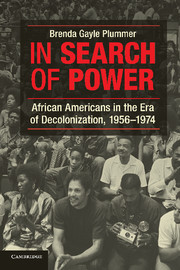Book contents
- Frontmatter
- Contents
- Figures
- Introduction
- 1 A Great Restlessness
- 2 Peace or a Sword?
- 3 “Freedom’s Struggle Crosses Oceans and Mountains”
- 4 Meeting Odinga
- 5 When Race Doesn’t Matter
- 6 Embracing the Globe
- 7 Race, Space, and Displacement
- 8 Africa and Liberation
- 9 Agenda Setting on Two Continents
- Conclusion
- Bibliography
- Index
- References
Conclusion
Published online by Cambridge University Press: 05 December 2012
- Frontmatter
- Contents
- Figures
- Introduction
- 1 A Great Restlessness
- 2 Peace or a Sword?
- 3 “Freedom’s Struggle Crosses Oceans and Mountains”
- 4 Meeting Odinga
- 5 When Race Doesn’t Matter
- 6 Embracing the Globe
- 7 Race, Space, and Displacement
- 8 Africa and Liberation
- 9 Agenda Setting on Two Continents
- Conclusion
- Bibliography
- Index
- References
Summary
This study ends in 1974 with the issues of colonialism and African-American civil rights oddly unsettled, with race once again resurgent as a marker of both individual and national fates in the United States and abroad. Sovereignty and freedom were more problematic than expected. While statism retained its allure, the succeeding era was one in which transnational decisions that bypassed foreign offices reduced the power of central governments. A slackening of state control, increasingly evident after the collapse of Soviet communism, deeply marked international society and culture, and many kinds of migration (tourists, labor, refugees, technology, capital, information, images, and religious values). Contemporaries have been highly conscious of these transitions and actively attempt to mediate them in their own interests.
When black and white educators, officials, corporate leaders, and foundation representatives met in the mid-1950s to decide what to do about the growing clamor over integration and decolonization, they had already anticipated to some degree the scope of the impending changes that would overtake the world. They chose to make allies of the new insurgents. A Western victory in the cold war required the recruitment of emerging states and their most important citizens: new classes and politicized youth who would share elite values. While the goal of independence for the global South would be upheld, broader critiques of the international behavior of Western powers were disallowed or deemed subversive of world order. The U.S. policy establishment sought, at best, the invisibility of race and, at least, its neutrality. Civil rights, perceived as a domestic issue for Americans, was dissociated from antiimperialism. The Left, in contrast, strove to join African-American freedom struggles to worldwide radical movements and restore the affinities that they had often had in the past. Black nationalists, who could range widely on the Right to Left spectrum, did not accept cold war liberalism and did not have to rediscover a past association with Africa. Rapid decolonization in the early 1960s, the Congo crisis, and the Algerian war coincided with the domestic mass mobilizations of the civil rights movement and provided opportunities for activists to link issues of racial justice to overseas events while new states faced rival superpowers’ determination to extend their conflicts across the globe.
- Type
- Chapter
- Information
- In Search of PowerAfrican Americans in the Era of Decolonization, 1956–1974, pp. 343 - 350Publisher: Cambridge University PressPrint publication year: 2012



